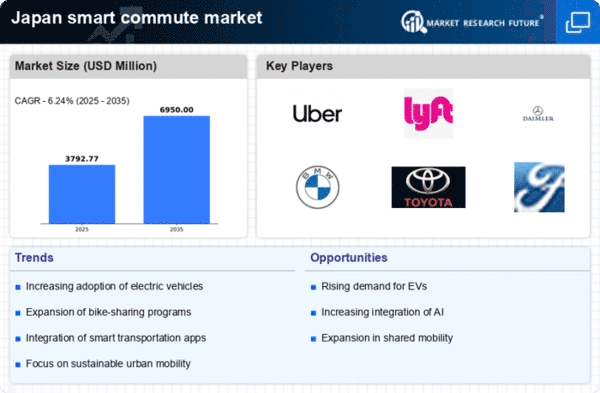Integration of Mobility Services
The integration of various mobility services is emerging as a key driver in the smart commute market. In Japan, the convergence of ride-sharing, public transport, and micro-mobility options is creating a seamless commuting experience for users. This trend is facilitated by advancements in mobile technology, allowing commuters to access multiple transport modes through a single platform. Recent data indicates that the usage of integrated mobility apps has increased by 20% in urban areas, highlighting a shift towards more flexible commuting solutions. As consumers seek convenience and efficiency, the smart commute market is likely to benefit from this integration, fostering collaboration among transport providers and enhancing overall service delivery.
Government Initiatives and Policies
Government initiatives play a crucial role in shaping the smart commute market in Japan. The Japanese government has been actively promoting policies aimed at reducing traffic congestion and enhancing public transportation systems. For example, the implementation of subsidies for electric vehicles and investments in smart infrastructure are part of a broader strategy to encourage sustainable commuting. Recent reports indicate that government funding for smart transport projects has increased by 30% in the last year, reflecting a commitment to innovation in this sector. These initiatives not only support the development of the smart commute market but also align with Japan's goals for environmental sustainability and urban mobility. As such, government actions are likely to continue influencing market dynamics significantly.
Urbanization and Population Density
Japan's ongoing urbanization and high population density are pivotal drivers of the smart commute market. With over 90% of the population residing in urban areas, the demand for efficient and sustainable commuting solutions is paramount. The concentration of people in cities like Tokyo and Osaka creates unique challenges, such as traffic congestion and pollution. Consequently, there is a growing need for smart commuting options that can alleviate these issues. Data suggests that urban areas are expected to see a 15% increase in public transport usage over the next decade, which could further stimulate the smart commute market. This trend indicates a shift towards integrated transport solutions that cater to the needs of densely populated regions, thereby enhancing the overall commuting experience.
Environmental Concerns and Sustainability
Environmental concerns are increasingly influencing the smart commute market in Japan. As awareness of climate change and pollution rises, there is a growing demand for sustainable commuting options. The Japanese government has set ambitious targets to reduce greenhouse gas emissions, which has led to a push for electric vehicles and public transport enhancements. Recent statistics reveal that the market for electric vehicles is projected to grow by 40% in the next five years, reflecting a shift towards greener alternatives. This trend is likely to drive innovation within the smart commute market, as companies seek to develop eco-friendly solutions that align with consumer preferences. The emphasis on sustainability is expected to reshape commuting habits, making it a critical driver of market growth.
Technological Advancements in Transportation
The smart commute market in Japan is experiencing a surge due to rapid technological advancements in transportation. Innovations such as autonomous vehicles, real-time traffic monitoring systems, and mobile applications for route optimization are transforming the commuting experience. For instance, the integration of AI and IoT technologies is enhancing the efficiency of public transport systems, making them more user-friendly. According to recent data, the adoption of smart transportation solutions is projected to increase by 25% over the next five years. This growth is likely to drive investments in infrastructure and technology, further propelling the smart commute market. As urban areas become more congested, the demand for these advanced solutions is expected to rise, indicating a robust future for the smart commute market in Japan.
















